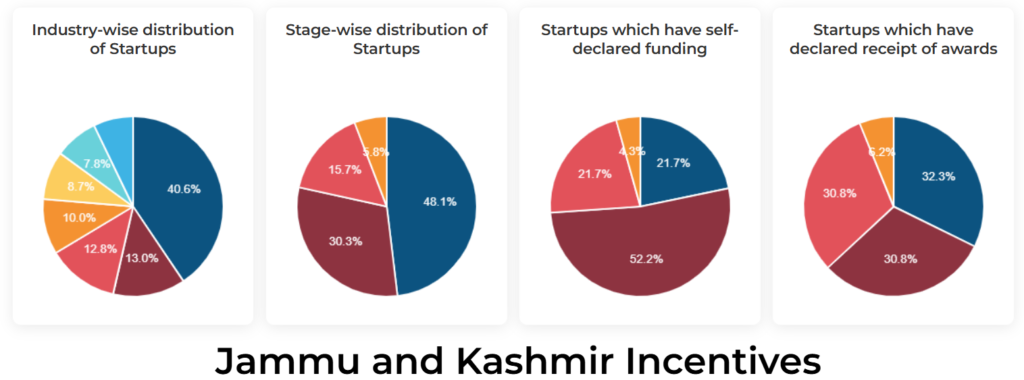Funding Sources Supporting the Kashmir Startup Ecosystem
The Kashmir startup ecosystem is witnessing a remarkable transformation, driven by a surge of youth-led innovation, government-backed initiatives, and rising investor interest. Once overlooked in the national startup narrative, the region is now emerging as a promising hub of entrepreneurship and digital growth.
In the valleys of Jammu & Kashmir, known for their beauty and resilience, a new wave of youth-led innovation is emerging—powered by vision, courage, and unprecedented government support. At the forefront of this movement is Curve Electric, a Srinagar-based e-bike sharing startup that is transforming how people move in the region’s cities and towns.

Started by two young entrepreneurs, Sheikh Yameen and Zubair Bhat, Curve Electric is Kashmir’s first electric bicycle-sharing platform. Their mission is simple but revolutionary: make sustainable, smart transport accessible to everyone—students, workers, tourists—through easy-to-use electric bikes stationed across the city.
But what truly sets their story apart is how they’ve leveraged Jammu & Kashmir’s evolving startup ecosystem and central government schemes to turn a local idea into a scalable business.
Kashmir’s New Era: Innovation is the Way Forward
The Union Territory of Jammu & Kashmir is witnessing a historic shift. Once limited in economic options, the region now stands at the edge of an entrepreneurial renaissance, led by young problem-solvers who want to build and stay. Fueling this shift is the Jammu & Kashmir Startup Policy 2024–27, launched by the UT administration with ambitious targets.
| Key Highlights of J&K Startup Policy 2024–27 | Details |
|---|---|
| Startups to be supported | 2,000+ by 2027 |
| Seed funding per startup | Up to ₹20 lakh |
| District incubation centers | 20+ planned |
| Patent filing assistance | Up to 100% reimbursement |
| Land and infrastructure support | Fast-track allotment via SIDCO/SICOP |
| Dedicated startup portal | www.jkstartup.in |
This policy ensures that local innovators—especially those working in areas like green energy, agriculture, tourism, IT, and climate tech—have the tools, funds, and platforms to thrive. Curve Electric is a powerful example of what’s possible when the right support meets the right idea.
From Srinagar Streets to Smart Cities
Curve Electric’s success story begins with a problem most Kashmiris know well: limited, unreliable, and polluting transport options. Their solution—GPS-enabled, terrain-optimized e-bikes—offers a clean, affordable alternative.
| Impact Metric | Value |
|---|---|
| Total rides | 55,000+ |
| Kilometers covered | 720,000+ km |
| Carbon emissions saved | 145 metric tons |
| User base | Thousands of daily riders |
Their rapid growth was made possible not just by innovation, but by active partnership with Srinagar Smart City Limited (SSCL)—a move supported by central government programs like the Smart Cities Mission and Startup India.
| Scheme Name | Benefits for Startups |
|---|---|
| Startup India | DPIIT recognition, tax exemption, access to funding |
| Smart Cities Mission | Mobility integration, public infrastructure support |
| FAME II (Electric Mobility) | Subsidies on EV parts, charging, and battery systems |
| Atal Innovation Mission | Funding for incubators, innovation labs, and mentors |
StartupJK: A Digital Gateway for All Stakeholders
At the foundation of J&K’s startup ecosystem is StartupJK, a dedicated online platform launched by the Industries & Commerce Department. It connects startups, investors, mentors, and incubators and facilitates real-time access to central and UT-level schemes.
| Service Type | Description |
|---|---|
| Centralized Registration | Unified sign-up with Startup India and DPIIT |
| Seed Fund Application | Direct application for Startup India Seed Fund Scheme (SISFS) |
| Scheme Directory | Access to all relevant central and state-level startup policies |
| Stakeholder Matching | Links startups to mentors, VCs, incubators, and government units |
| Updates and Announcements | Regular updates on grants, policies, bootcamps, and events |

Startup India and J&K Policy: A Strategic Convergence for Growth
Jammu & Kashmir’s startup story is not unfolding in isolation. It is tightly integrated with the national vision of entrepreneurship through Startup India, a flagship initiative of the Government of India. As of 2024, 722 startups from the UT have been officially recognized by the Department for Promotion of Industry and Internal Trade (DPIIT)—a remarkable leap for a region that, until recently, lacked an organized startup framework.
What makes this figure even more compelling is the diversity and inclusiveness within these ventures. Of the 722 startups, 254 are led by women entrepreneurs, reflecting a steady but strong trend of gender participation in innovation and enterprise. These numbers point not only to changing aspirations but also to a policy ecosystem that actively nurtures such transformation.
Jammu & Kashmir’s startup ecosystem showcases significant traction in key sectors. The construction and engineering sector dominates with 49% of total startups, likely due to the region’s infrastructure needs and government-backed projects. Other prominent domains include skill development (13%), transportation and oil & gas (12%), IT consulting (9%), and agriculture and food processing (8%). Business services and emerging sectors also contribute to the overall startup landscape.
| Sector | Share of Startups |
|---|---|
| Construction & Engineering | 49% |
| Skill Development | 13% |
| Oil & Gas/Transportation | 12% |
| IT Consulting & Tech | 9% |
| Agritech & Food Processing | 8% |
| Business Services | 6% |
| Others | 3% |
To translate policy into measurable outcomes, a robust governance structure is in place. The High-Powered Committee, chaired by the Chief Secretary of the UT, oversees strategic implementation. Day-to-day execution falls under a Task Force led by the Administrative Secretary, Industries & Commerce, while JKEDI (Jammu and Kashmir Entrepreneurship Development Institute) serves as the nodal agency, managing incubation, funding disbursement, and mentorship facilitation
Funding the Future: Results on the Ground
The outcomes of these interventions are tangible. As of October 2024, 942 startups have been formally recognized in Jammu & Kashmir, marking a substantial increase from previous years. These ventures have collectively created 4,932 direct jobs, with a growing focus on hiring local youth, particularly in Tier II and III towns.

Government-backed funding mechanisms are also beginning to show measurable impact. Under the Fund of Funds for Startups (FFS), ₹50 crore has been invested in J&K startups through Alternative Investment Funds (AIFs). Additionally, ₹2.05 crore has been sanctioned under the Startup India Seed Fund Scheme (SISFS) to provide early-stage capital for idea validation, prototype development, and product-market fit.
Government-Backed Startup Funding in Jammu & Kashmir
| Funding Source | Amount Disbursed/Invested |
|---|---|
| FFS via Alternative Investment Funds (AIFs) | ₹50 crore |
| SISFS Grants | ₹2.05 crore |
| Jobs Created | 4,932 |
| Total DPIIT-Recognized Startups | 942 |
These figures underscore a system that not only enables innovation but actively invests in it—financially and structurally.
From Srinagar to Shark Tank: A Startup’s National Moment

A defining milestone in Kashmir’s entrepreneurial journey came when Curve Electric featured on Season 4 of Shark Tank India. Their pitch introduced a scalable, real-world innovation that challenges traditional models of mobility. With features like zero app downloads, no security deposits, and pay-per-use GPS-enabled e-bikes, Curve Electric caught the attention of viewers and investors alike.
The startup has developed plug-and-play solutions tailored for college campuses, hospitality chains, and urban commuters—offering a green, smart commuting option in hilly geographies. Their expansion roadmap now includes towns like Shimla, Mussoorie, and over 1,400 academic institutions across India.
Speaking on national television, co-founder Sheikh Yameen emphasized how the support from both Startup India and the J&K government enabled their startup to reach this level of maturity and visibility. His words reflected a broader reality—that policy alignment and startup innovation are now moving in tandem, putting Kashmir firmly on India’s startup map


